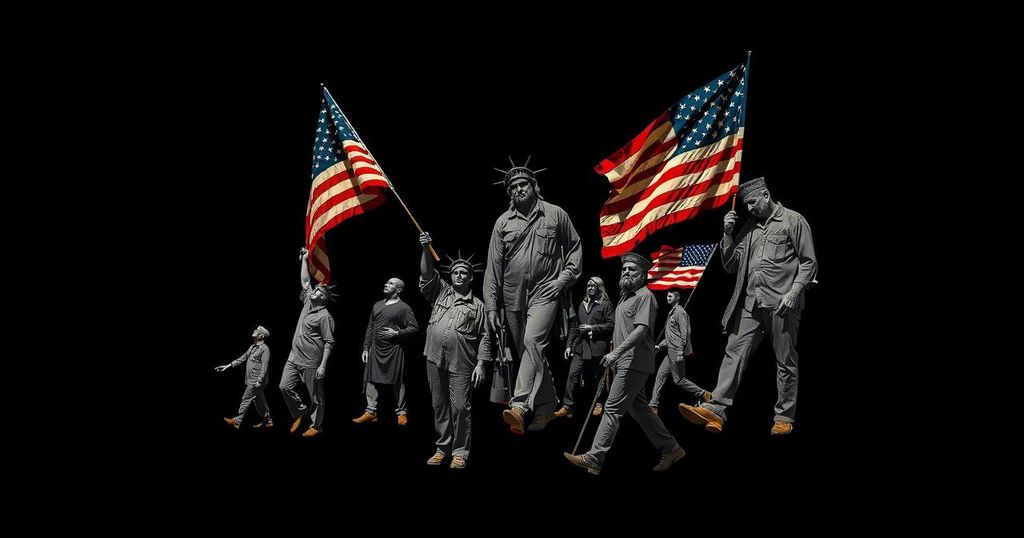America’s Political Illusion: The Dilemma of Arab and Muslim American Voters

The article discusses the perception of the United States as a decaying myth of democracy, illustrating how both major political parties fail to offer meaningful choices for Arab and Muslim American voters. It highlights the troubling lack of distinction in their stances regarding the Israeli-Palestinian conflict and urges these communities to remain uncommitted to candidates who neglect humanitarian issues, advocating instead for justice and recognition of their plight.
The United States is increasingly perceived as a crumbling myth, where the notion of democracy serves merely as an illusion for the unsuspecting populace, suggesting that there is a significant difference between its two major political parties. As the nation approaches yet another highly publicized presidential election, the rhetoric surrounding the electoral stakes rings hollow and perpetuates the same binary narratives of choice that have characterized American politics throughout history. The reality is that American voters are often given the illusion of choice between candidates who largely uphold the same core principles, particularly regarding contentious issues like foreign policy. Arab and Muslim American voters, in particular, face a unique dilemma as both leading candidates have openly supported the actions of the Israeli government, contributing to ongoing violence in Gaza and the West Bank. The lack of distinction between the stances of Democratic and Republican candidates regarding key humanitarian issues places Arab and Muslim Americans in a precarious position, forcing them to contemplate whether to vote or abstain altogether. Both Kamala Harris and Donald Trump have shown unquestionable support for Israel’s right to defend itself while sidestepping the grim reality of ongoing atrocities resulting in substantial loss of life, particularly among Palestinian civilians. The refusal of both parties to explicitly label these actions as genocide further complicates the situation. In their pursuit of political gain, Democrats and Republicans alike have disregarded the voices of those who oppose these policies, branding protesters as sympathizers of terrorism while simultaneously ignoring the outcry for justice from Arab and Muslim communities. With the election looming, anxiety grows within the Democratic Party regarding the potential electoral repercussions from these marginalized voters. Harris’s hollow attempts at outreach have been met with skepticism, and the party’s rhetoric may cloak an underlying strategy of coercion, suggesting that a protest vote against the Democratic ticket would enable a regression into a more harmful political landscape under Trump. The admonitions directed at Arab and Muslim Americans to align with the Democratic Party or bear responsibility for the consequences of a Trump presidency reflect a troubling dynamic, one which implies that their historical lack of trust and consistent marginalization renders them voiceless. Moving forward, these communities are urged to exercise their agency by rejecting the false dichotomy presented by the leading political candidates. Echoing the sentiment of taking a long view, it has become imperative for Arab and Muslim Americans to remain steadfast in their convictions, conveying a message of discontent with the established political order. They are encouraged to maintain their commitment to justice and equality for their Palestinian counterparts, rather than acquiescing to the demands of political figures who have consistently sidelined their voices. Remaining uncommitted in spirit and intention reflects a profound act of self-respect and a necessary stand in recognition of the suffering endured by their communities across the globe.
The article critiques the state of American democracy, particularly how both major political parties perpetuate an illusion of choice among voters. It highlights the challenges faced by Arab and Muslim Americans in navigating their political agency, especially concerning issues of foreign policy relating to the Israeli-Palestinian conflict. The author also addresses the growing fear among Democrats regarding potential voter repercussions and underscores the need for marginalized communities to remain true to their principles rather than succumb to political pressure.
In conclusion, the current political climate in the United States presents a challenge for disenfranchised communities, particularly Arab and Muslim Americans, who must navigate a landscape defined by insufficient representation and the troubling actions of both political parties. The call to remain committed to justice for Palestinians and to exercise political agency reflects a necessary resistance to a system that often disregards their voices. Ultimately, the empowerment of these communities will require a principled stand against the status quo, affirming that their lives and concerns matter in the ongoing discourse of American democracy.
Original Source: www.aljazeera.com







